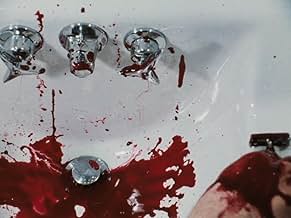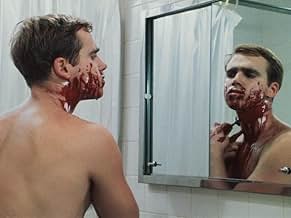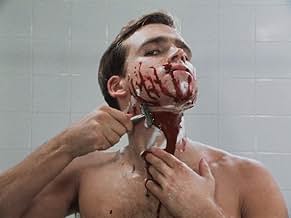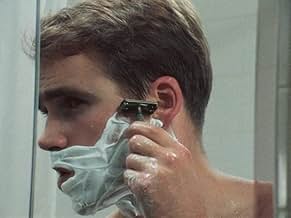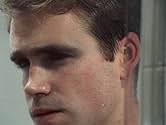NOTE IMDb
7,0/10
9,4 k
MA NOTE
Ajouter une intrigue dans votre langueIn the process of shaving, a young man cuts himself. A lot.In the process of shaving, a young man cuts himself. A lot.In the process of shaving, a young man cuts himself. A lot.
- Réalisation
- Scénario
- Casting principal
- Récompenses
- 1 victoire au total
Avis à la une
"The Big Shave" is disturbingly bold, brave and of course, bloody... but no one would certainly have remembered it had it not been the first film of director Martin Scorsese.
The various parts of an ordinary bathrooms are shown through a stylish editing and under a smooth and relaxed 30's jazz music that will be the film's only sound. Then a young man enters, nothing special about him, he's young, not bad-looking and still dazed of sleepiness, he puts some shaving foam, takes his razor and so begins the shave. Not so big at first, it goes well and then he puts more foam and repeats the same modus operandi then it goes on... and on, the first drops of blood soils the immaculate white porcelain. The man is tracing horizontal lines of blood all over his cheeks, drops of blood have been replaced by red flooding on the sink and the film climaxes with the man cutting (not slitting) his throat, from ear to ear, making vertical lines of blood on his chest and as he (finally) puts his razor, the images fades to a red screen. And whoever provided that (fake?) blood deserved to be mentioned in the credits.
By the way, the alternate title is given at the end credits and it's Viet '67.
Obviously, it's a metaphor of the Vietnam War but instead of sticking to the obvious (since the director mentions it), I appreciate how the use of jazz music, shockingly casual and relaxed, fits the relative indifference of the exterior eye toward the conflict, especially if jazz reflects the "older" generation. But more disturbing is the man's own indifference. This is a fine man, at the peak of his youth and watching him mutilating himself isn't just horrific because of the graphicness but because it feels like a terrible waste, extremely pointless. In fact, he didn't even look like he needed a shave... and that's the point for the movie whose name's Viet 67. Marty was of the same generation of the youth sacrificed in Nam and this his angst cry.
It's by the way interesting that Marty would also be present in Woodstock as an editor and it's only fitting that he could witness the most iconic artistic expression of that anger because was also destined to become one of the greatest artists of his generation and his legacy immortalized the film. And what a legacy! I won't drop titles right now because I'll use them to make my points.
Now, a few days ago, I was watching "The Irishman" and I observed how desensitized I was to the effect of gunshots, but still, the big picture affected me, it's not the use of violence that shocks but its pointlessness. Indeed, just because there's a cause to violence doesn't make it reasonable for all that... Travis Bickle did use violence to save a young prostitute but let's not forget it was Plan B after failing to assassinate a politician, just because he gave violence a meaning (and even justification) didn't make his motives any nobler. There's always an element of ego and hubris in these characters, something that confines to self-destruction... Hoffa not getting the threats, Tommy De Vito or Nicky Santoro escalating in violence, La Motta getting increasingly jealous and taking all the hits against Sugar Ray Robinson, it all started with that man that keeps shaving as if blood had no effect whatsoever.
And why do we shave? To look clean or good. It's America's obsession, how do we look in front of the world, it's not an obsession for violence, but a self-obsession that Marty exorcizes because, maybe, he feels concerned by the own thing he denounces. Indeed, the film might betray a sort of hypnotic gaze toward blood, the young sickly director who couldn't become a priest and became famous by portraying sinners, insisting that it's only in the streets that you could find redemption, not in church. It goes back to his deep belief in Jesus Christ and I couldn't help but think of Willem Defoe's relieved smile in "Last Temptation of Christ", when he realizes he's being crucified (renouncing the other path), he doesn't even feel the suffering, he almost savors it.
The Christ's blood has been part of the Catholic symbolism, and behind the condemnation of violence, there's a weird and hypnotic fascination of Marty's eye for blood, not violence but blood... as if Scorsese was intoxicated by the Christ's own blood. This artistic inebriation foreshadows the unique style of a director who didn't make violence cool, but he didn't make it ugly either. Violence by essence can't be boring, Tarantino knows it too, but Scorsese gives violence a meaning that cuts straight to your soul.
And "The Big Shave" is fascinating in the way it contains the core of Scorsese's movies, that mix of fascination and revulsion for violence, echoed in each of his films and rooted in his Catholic upbringing, his New Yorker heart... and his conscience as an American who can't stand watching his country sacrificing its youth. Marty's not a pacifist or a conscience objector but a man who knows too much the cathartic value of violence to see it used in vain... and understanding "The Big Shave" is understanding the roots of his torment and ultimately his genius.
The various parts of an ordinary bathrooms are shown through a stylish editing and under a smooth and relaxed 30's jazz music that will be the film's only sound. Then a young man enters, nothing special about him, he's young, not bad-looking and still dazed of sleepiness, he puts some shaving foam, takes his razor and so begins the shave. Not so big at first, it goes well and then he puts more foam and repeats the same modus operandi then it goes on... and on, the first drops of blood soils the immaculate white porcelain. The man is tracing horizontal lines of blood all over his cheeks, drops of blood have been replaced by red flooding on the sink and the film climaxes with the man cutting (not slitting) his throat, from ear to ear, making vertical lines of blood on his chest and as he (finally) puts his razor, the images fades to a red screen. And whoever provided that (fake?) blood deserved to be mentioned in the credits.
By the way, the alternate title is given at the end credits and it's Viet '67.
Obviously, it's a metaphor of the Vietnam War but instead of sticking to the obvious (since the director mentions it), I appreciate how the use of jazz music, shockingly casual and relaxed, fits the relative indifference of the exterior eye toward the conflict, especially if jazz reflects the "older" generation. But more disturbing is the man's own indifference. This is a fine man, at the peak of his youth and watching him mutilating himself isn't just horrific because of the graphicness but because it feels like a terrible waste, extremely pointless. In fact, he didn't even look like he needed a shave... and that's the point for the movie whose name's Viet 67. Marty was of the same generation of the youth sacrificed in Nam and this his angst cry.
It's by the way interesting that Marty would also be present in Woodstock as an editor and it's only fitting that he could witness the most iconic artistic expression of that anger because was also destined to become one of the greatest artists of his generation and his legacy immortalized the film. And what a legacy! I won't drop titles right now because I'll use them to make my points.
Now, a few days ago, I was watching "The Irishman" and I observed how desensitized I was to the effect of gunshots, but still, the big picture affected me, it's not the use of violence that shocks but its pointlessness. Indeed, just because there's a cause to violence doesn't make it reasonable for all that... Travis Bickle did use violence to save a young prostitute but let's not forget it was Plan B after failing to assassinate a politician, just because he gave violence a meaning (and even justification) didn't make his motives any nobler. There's always an element of ego and hubris in these characters, something that confines to self-destruction... Hoffa not getting the threats, Tommy De Vito or Nicky Santoro escalating in violence, La Motta getting increasingly jealous and taking all the hits against Sugar Ray Robinson, it all started with that man that keeps shaving as if blood had no effect whatsoever.
And why do we shave? To look clean or good. It's America's obsession, how do we look in front of the world, it's not an obsession for violence, but a self-obsession that Marty exorcizes because, maybe, he feels concerned by the own thing he denounces. Indeed, the film might betray a sort of hypnotic gaze toward blood, the young sickly director who couldn't become a priest and became famous by portraying sinners, insisting that it's only in the streets that you could find redemption, not in church. It goes back to his deep belief in Jesus Christ and I couldn't help but think of Willem Defoe's relieved smile in "Last Temptation of Christ", when he realizes he's being crucified (renouncing the other path), he doesn't even feel the suffering, he almost savors it.
The Christ's blood has been part of the Catholic symbolism, and behind the condemnation of violence, there's a weird and hypnotic fascination of Marty's eye for blood, not violence but blood... as if Scorsese was intoxicated by the Christ's own blood. This artistic inebriation foreshadows the unique style of a director who didn't make violence cool, but he didn't make it ugly either. Violence by essence can't be boring, Tarantino knows it too, but Scorsese gives violence a meaning that cuts straight to your soul.
And "The Big Shave" is fascinating in the way it contains the core of Scorsese's movies, that mix of fascination and revulsion for violence, echoed in each of his films and rooted in his Catholic upbringing, his New Yorker heart... and his conscience as an American who can't stand watching his country sacrificing its youth. Marty's not a pacifist or a conscience objector but a man who knows too much the cathartic value of violence to see it used in vain... and understanding "The Big Shave" is understanding the roots of his torment and ultimately his genius.
So I'm not the only person who's had this particular spooky dream! Plainly influenced by Kenneth Anger, this eye-watering short looks more like an early work by David Lynch than Martin Scorsese.
Big Shave, The (1967)
**** (out of 4)
Six-minute short from the now legendary director feature a lot of his trademark even though this is basically just a student film. A young man goes in front of the mirror to shave and it goes fine until he decides to do it again and this time he butchers his face with the razor, which sends blood all down the sink. I've heard this was an anti-Vietnam film but I really didn't see it as such, although I guess you could draw a message out of what happens here. To me this is a wonderful little black comedy that's certainly going to hit home to anyone who has ever cut themselves shaving. The film doesn't go for minor little cuts but instead it's a real bloodbath and I might even go as far as to say this contains some of the most blood ever put on film during this time. You have the H.G. Lewis films of course and I can't help but wonder if Scorsese was a fan of those since there's a lot of the same humor here. The movie has a nice music score, great editing and in the end is just painfully funny.
**** (out of 4)
Six-minute short from the now legendary director feature a lot of his trademark even though this is basically just a student film. A young man goes in front of the mirror to shave and it goes fine until he decides to do it again and this time he butchers his face with the razor, which sends blood all down the sink. I've heard this was an anti-Vietnam film but I really didn't see it as such, although I guess you could draw a message out of what happens here. To me this is a wonderful little black comedy that's certainly going to hit home to anyone who has ever cut themselves shaving. The film doesn't go for minor little cuts but instead it's a real bloodbath and I might even go as far as to say this contains some of the most blood ever put on film during this time. You have the H.G. Lewis films of course and I can't help but wonder if Scorsese was a fan of those since there's a lot of the same humor here. The movie has a nice music score, great editing and in the end is just painfully funny.
The Big Shave (1967) D: Martin Scorsese. Peter Bernuth. Excellent Martin Scorsese short film about a young man who is shaving and cuts himself, with the results symbolic of the Vietnam War, which Scorsese was opposed to. The camerawork is fluid and flawless, the scene very bloody, but wonderfully done, one of the best short films I've seen. RATING: 9 out of 10.
This is six minutes of introduction to the world of Martin Scorsese. You may anticipate a story but it is only portrait of an obsessive shaver who shaves until he makes a bloodbath out of his face. A gruesome sight to average spectator ,and in one shot even to a more sophisticated one when the man pulls the blade from one end of his neck to another and acts very convincingly, this short film is an unblinking portrait of violence and especially personal violence for that matter, with a strong streak of masochism familiar to the fans of Scorsese. A man shaves or punishes himself for no apparent reason but cleansing(his face or his soul?). Also you can see the making of a director infatuated with the montage who will use its techniques for years to come.
The Big Shave also displays an effective use of two colors in jarring contrast for an aesthetic purpose: white of the bathroom and red of the blood. White and Red devour the character and the viewer and signal the world of a director in love with radical shifts and juxtapositions. overall a student film from Scorsese in retrospect is a lesson in film history. Experiment is the prerequisite of perfection. The jazz song which accompanies the whole film and unites its images has been wonderfully used.
The Big Shave also displays an effective use of two colors in jarring contrast for an aesthetic purpose: white of the bathroom and red of the blood. White and Red devour the character and the viewer and signal the world of a director in love with radical shifts and juxtapositions. overall a student film from Scorsese in retrospect is a lesson in film history. Experiment is the prerequisite of perfection. The jazz song which accompanies the whole film and unites its images has been wonderfully used.
Le saviez-vous
- AnecdotesThis film is included in the "Martin Scorsese Shorts" set, released by the Criterion Collection, spine #1,030.
- Crédits fousWhiteness - Herman Melville
- Versions alternativesSome prints allegedly contain a final title card connecting the film to the Vietnam War, though such prints are no longer in circulation, nor is it on the videocassette version.
- ConnexionsFeatured in Midnight Underground: The Surreal (1993)
Meilleurs choix
Connectez-vous pour évaluer et suivre la liste de favoris afin de recevoir des recommandations personnalisées
Détails
- Date de sortie
- Pays d’origine
- Site officiel
- Langue
- Aussi connu sous le nom de
- La gran afaitada
- Lieux de tournage
- Ville de New York, New York, États-Unis(location)
- Sociétés de production
- Voir plus de crédits d'entreprise sur IMDbPro
Contribuer à cette page
Suggérer une modification ou ajouter du contenu manquant


